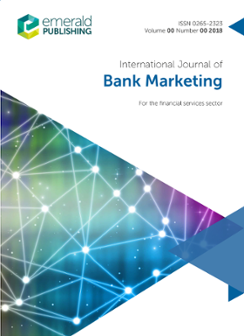How do Australian female consumers exercise their decision-making power when making financial product decisions? The triad of financial market manipulation, rationality and emotions
IF 6.9
3区 管理学
Q1 BUSINESS
引用次数: 0
Abstract
PurposeThis study explores the decision-making powers of Australian female consumers in the financial product market. More precisely, it examines how the integrative effects of rationality, emotions and personality traits influence the decision-making powers of Australian female consumers when making financial product purchase decisions.Design/methodology/approachThe study employs a quantitative research approach, utilising a survey strategy. The proposed conceptual model was tested using structural equation modelling (AMOS) on a valid 357 responses from Australian female consumers.FindingsThe findings revealed that rationality, self-efficacy and impulsivity have a positive impact on the decision-making powers of Australian female consumers. Besides this, self-efficacy and anxiety had significant moderating effects on the decision-making power of Australian female consumers when buying financial products, whereas anger and impulsivity were found to have no moderating effects.Research limitations/implicationsThe study offers understanding on the role of emotions and personality traits in financial decision-making, which can help financial institutions design sound products and services that can also ensure consumers' overall well-being.Originality/valueInformed by the theoretical notions of the appraisal-tendency framework (ATF) and emotion-imbued choice model (EIC), the study makes a unique contribution by investigating the impact of rationality, emotions and personality traits on the decision-making powers of female consumers in the Australian financial product market.澳大利亚女性消费者在进行理财产品决策时是如何行使决策权的?金融市场操纵、理性与情绪的三合一
本研究探讨澳洲女性消费者在金融产品市场上的决策权。更准确地说,它考察了理性、情感和人格特质的综合效应如何影响澳大利亚女性消费者在进行金融产品购买决策时的决策权。设计/方法/方法这项研究采用了定量研究方法,利用了调查策略。采用结构方程模型(AMOS)对357名澳大利亚女性消费者的有效回答进行了概念模型测试。研究结果显示,理性、自我效能和冲动对澳大利亚女性消费者的决策权有正向影响。此外,自我效能感和焦虑对澳大利亚女性消费者购买金融产品的决策能力有显著的调节作用,而愤怒和冲动对其没有调节作用。研究局限/启示本研究提供了对情绪和人格特征在金融决策中的作用的理解,这可以帮助金融机构设计健全的产品和服务,也可以确保消费者的整体福祉。原创性/价值本研究在评估倾向框架(ATF)和情感浸润选择模型(EIC)的理论概念基础上,研究了理性、情感和人格特质对澳大利亚金融产品市场女性消费者决策权的影响,做出了独特的贡献。
本文章由计算机程序翻译,如有差异,请以英文原文为准。
求助全文
约1分钟内获得全文
求助全文
来源期刊

International Journal of Bank Marketing
BUSINESS-
CiteScore
10.70
自引率
18.90%
发文量
54
期刊介绍:
International Journal of Bank Marketing (IJBM) aims to publish papers that relate to the marketing challenges of financial services providers around the globe.
Preference is given to empirically-based research papers that expand on existing theories (or develop new ones) on customer behaviour in financial services settings.
In addition, the journal is interested in helping academicians and practitioners in the field to better understand the discipline of financial services marketing, and as a result review papers and thought pieces are invited for submission.
 求助内容:
求助内容: 应助结果提醒方式:
应助结果提醒方式:


